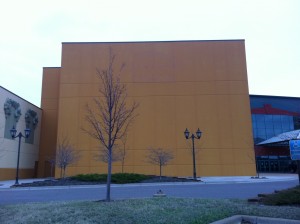The St. Michael City Council moved last night to reject a zoning ordinance amendment request from Riverside Church, based in Big Lake Township, altering the use of the former Cinemagic Theater location to a religious property, or “satellite campus.”
The decision brings to close, at the city government level a process that has lasted for the majority of 2014, starting with the church’s first inquiry into the property in April.
The two sides seemed close to an arrangement when the item was tabled late in the Nov. 11 meeting. The city’s attorney, council and staff took a recess with church attorney C. Greg Howese late in that meeting and returned with a desire to find an extension to the purchase agreement pending between Cinemasota Inc. and Riverside.
But that seemed to fall apart this week, as city council member Chris Schumm reported each member of the council received a letter from Howese, on behalf of the church, declaring the city was infringing on the church’s constitutional rights by asking for conditions attached to the ordinance amendment.
Howese had stood firm on that platform on the St. Michael Planning Commission meeting last month, telling that panel of seven men the church would not accept conditions on its request. That led to a 7-0 vote to not recommend the request, handed up the city council.
“The city received a letter from Riverside Church given formal notice that they are withdrawing from all negotiations with the City siting their Constitutional Rights being violated by the City which has been theirclaim from day one. Unfortunately, this negated weeks of hard work by [St. Michael Community Development Director] Marc Weigle and [City Attorney] Dave Lenhart to attempt to compromise and reach an agreement that would protect the health, safety and welfare of the city as our council takes an oath to do,” Schumm reported Wednesday, after the council vote. He posted a message on his Facebook page addressed to constituents, as well.
The church continues to lean on the Religious Land Use and Institutionalized Persons Act (RLUIPA), an act confirmed in district court, in 2010, which states cities can’t place “undue burden” on religious organizations looking to rent or purchase gathering space, among other factors.
Under the act, Howese and the church’s pastors have said, the city doesn’t have legal ground to place restrictions on the purchase. Howese, in May, threatened litigation against the city, citing the act as legal grounds.
It’s unclear if that’s the next step the church will take. Pastor Skipp Machmer has said, repeatedly, he hoped the process wouldn’t come to a legal battle. However, any move after a rejection by the city, which occurred last night, would be discussed with attorneys and the church’s board of elders.
The city, meanwhile, has held firm to the belief that the building needs to remain part of a commercially zoned area, as defined by the city’s most recent Comprehensive Plan.
Longtime city servant and current planning commissioner David Dayon said that swayed his opinion more than anything.
“I’ve been through a few of these,” Dayon said at the planning meeting. “I think what the public really wants is us to stick to the plan. This is a community that doesn’t have a lot of space set aside for future commercial development. We do have an amount of land that would be suitable for building a church. In this case, that would be preferable, to me.”
